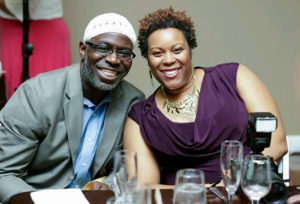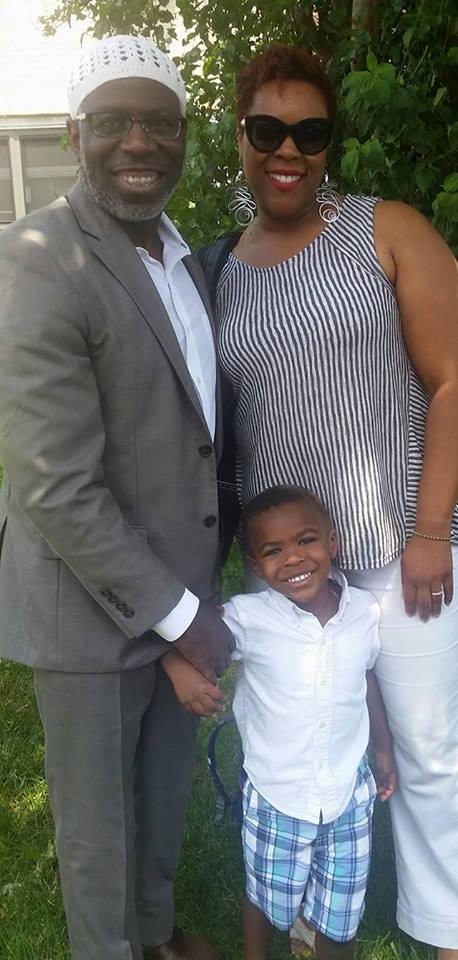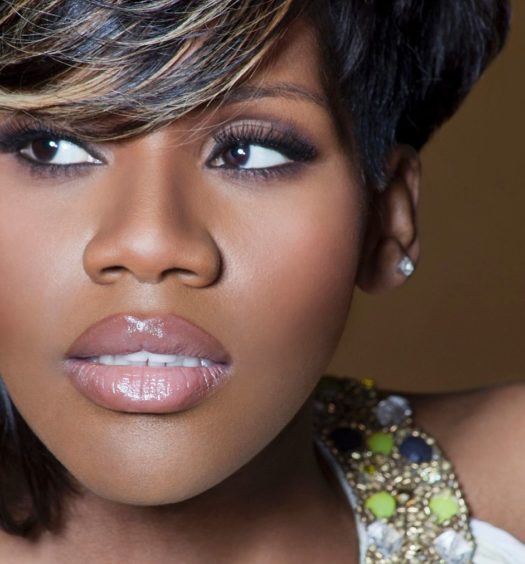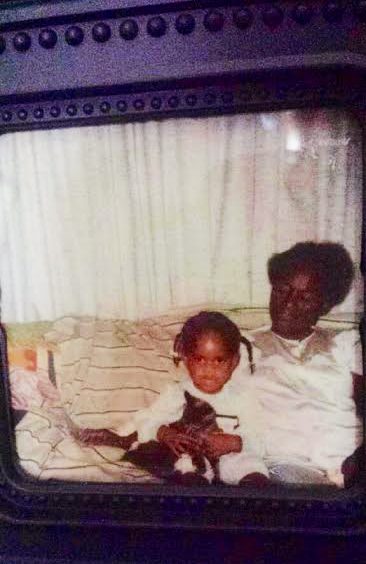TESTIMONY: ANDRE TURNER
“Her faith gave her the salvation and she was salvation!”
Andre Turner is first and foremost up to being a dad. He tells me during our interview, “You can’t see this from listening but I have a glow and I call the glow ‘new daddy bling’. Since my son Ayinde was born 4 years ago I’ve been feeling bright and shiny and happy about being a father. Enjoying fatherhood. Learning a lot. I tell everybody, he’s teaching me. And the package deal that comes with that is being a husband. I’m enjoying being a husband. Those two roles expressly have allowed me a space and a lane to grow unimaginable.” He’s also up to providing manhood development training for African American adolescent males. His organization Boys Coming of Age is located in Baltimore, Maryland and is a public health tool used to increase the life expectancy of black men who experience lower life expectancy when compared to other racial/ethnic groups.
Andre was born and raised in a family that values family. His grandmother, Rosa Johnson James (aka Grandma) (1917-2009) was the family matriarch. She left Pinewood, South Carolina for New York City where she became a domestic and laundress. One by one, she sent for her three children. She met Andre’s grandfather and began a new life, with a new man, in a new city.
In addition to giving birth to nine children, Grandma adopted five. Andre shared, “She had like long, strong arms. It’s kind of funny because she was very verbose, very expressive. But it was in that kind of way that was very loving. She would snap at you. She was very sharp with the tongue, but you knew it was because she loved you.” As the 5th of 8 children, he jokes that his older brothers got a different grandmother, in that she was more sharp tongued, more feisty, and less loving. He recalled telling his older brother, “Y’all must have had it really bad because the grandmother I got if she pulled up off the gas she must have really been flooring it when y’all was younger.”
“One thing that stood out was her spirituality. She was very active in her church. Almost to the point of embarrassment. We went to a Baptist church and it was very expressive. Evocative. It was experiential. When the spirit hit you…She was the kind of person who wanted to let God know she was a faithful servant and not just by reading. In church it was the clapping and the shouting and catching the Holy Ghost and all that. When I was young I would be embarrassed. But I just got used to it.”
“I was born and raised in the church and my grandmother didn’t play any pew sitting with her children. Everybody was on the usher board, the choir. My mother—the same thing. You just didn’t go to church and sit in the pew. You went to church and went to Sunday school. I was in the junior choir, the little people’s choir, the mass choir, the senior choir, the usher board. I was in all the plays. That spiritual piece was like the anchor. Having that spiritual foundation played the part in creating the ability to I don’t want to say survive, but how do you persevere and move forward when the cards and the deck are stacked against you and you have children that you have to raise? It was her spirituality that gave her the faith to keep on moving and pushing forward. And having foresight and vision to keep going forward without really knowing, except for having faith that God was going to see you through.”
In 1986, Andre was diagnosed with cancer. His grandmother visited him in the hospital and told him he needed to get well because “grandma’s gonna come and dance at your wedding.” In 2009, he proposed to his wife at Thanksgiving dinner among family and friends. Not soon after, she broke her femur bone and … her health declined rapidly. He went to the hospital to visit her, telling her “grandma you know you gotta get well so that you can come dance at my wedding. She threw her hands up and moved her hips like she was dancing and said, “Yeah, I’m going to be there.” And she didn’t make it. And I’ll never forget that because there was a surety in her voice, that was like you are going to get well. It was kind of funny because I didn’t believe that at the time—prior to her saying that. I was like it’s cancer. In the 80s that meant that you were going to die.”
She moved from Harlem, to a public housing project in the Bronx, to Queens where she and her husband bought a home. Of their 9 children, they had 6 boys and 3 girls. “All of my uncles were in and out of jail” and many succumbed to substance abuse. Despite the “stressors and pressure of protecting the flock from the kind of vices that were out there” his grandparents couldn’t shield their children from the social ills rampant in the communities where they lived.
“Seeing the challenges of burying her children before herself. I can only imagine what that kind of pain is for a mother. There were about 3 or 4 of her biological children left before she passed. Many of her children had passed before her and those were external and social dynamics. That interaction with the social from that vantage point. How did it get past the wall of protection and get to her children or her grandchildren. Because the same thing happened to my brothers, which were her grandsons.….I can only imagine what it was like for her having that dichotomy from her upbringing and seeing her children and her grandchildren in this new space (1970s culture and urban living) and contending with that.”
“My grandmother genuinely cared and gave a damn! I know that. And the siblings that she adopted were all around my age so I grew up with them. And when I went over to my grandmother’s house everybody was over to my grandmother’s house. She was kind of like that old lady that lived in the shoe. Like all the kids were over to my grandmother’s house. My grandmother was respected in the church. There was just no tarnish on who she was. She was just a respected person, in the community and in the church.”
“And it was like a nurturing piece. And my mother was very much the same. It was like just do right and be right. Do right and be right. It could have manifested itself in a number of different ways but I think for me being a male, it was do right as a male, be right as a male. That was the way that I expressed my grandmother’s virtues and values. Because they are principles. Her virtues and values passed on are expressed through me that way. Masculine healing. Masculine healing has a nurturing component. This is actually the light bulb moment for me. My grandmother was a nurturer and it’s funny because men do not get classified or type cast as nurturers. And that literally is my grandmother moving through me, creating that nurturing space for men. And it’s very important to me for men to be nurtured because there is a lot of pain that men hold onto. Open wounds. Open sores. Shadows that they live inside of. Pain. Shame. Blame and Guilt. Having another healthy emotional male be there opens the gates for camaraderie, bonding, and then healing. And that’s nurturing. Not that many spaces exist for men and I think there is a thirst and hunger…..having my grandmother and my mother come through me, I literally see the thirst and the hunger. Men are hungry to heal. Men are thirsty to heal…to know that they can go somewhere and release a little at a time is like salvation. And that was the thing that my grandmother brought. Her faith gave her the salvation and she was salvation!”





